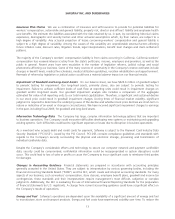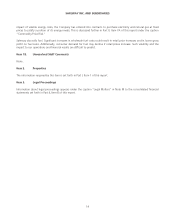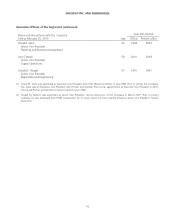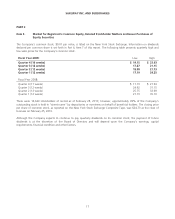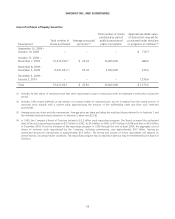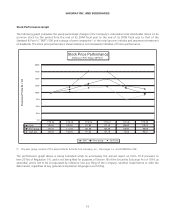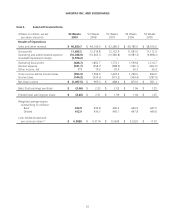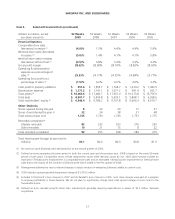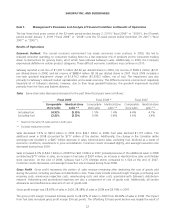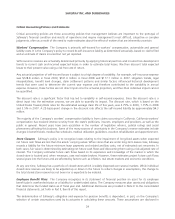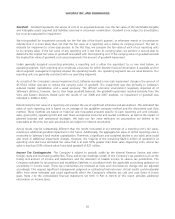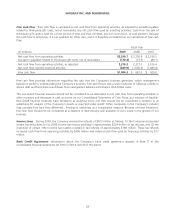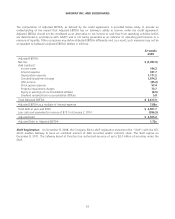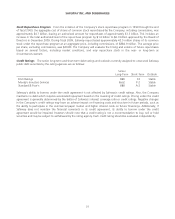Safeway 2009 Annual Report Download - page 40
Download and view the complete annual report
Please find page 40 of the 2009 Safeway annual report below. You can navigate through the pages in the report by either clicking on the pages listed below, or by using the keyword search tool below to find specific information within the annual report.
SAFEWAY INC. AND SUBSIDIARIES
Item 7. Management's Discussion and Analysis of Financial Condition and Results of Operations
The last three fiscal years consist of the 52-week period ended January 2, 2010 (“fiscal 2009” or “2009”), the 53-week
period ended January 3, 2009 (“fiscal 2008” or “2008”) and the 52-week period ended December 29, 2007 (“fiscal
2007” or “2007”).
Results of Operations
Economic Outlook The current economic environment has made consumers more cautious. In 2009, this led to
reduced consumer spending, to consumers trading down to a less expensive mix of products and to consumers trading
down to discounters for grocery items, all of which have reduced Safeway’s sales. Additionally, in 2009, the Company
experienced deflation in certain product categories. These difficult economic conditions may continue in 2010.
Safeway reported a net loss of $1,097.5 million ($2.66 per diluted share) in 2009, net income of $965.3 million ($2.21
per diluted share) in 2008, and net income of $888.4 million ($1.99 per diluted share) in 2007. Fiscal 2009 included a
non-cash goodwill impairment charge of $1,974.2 million ($1,818.2 million, net of tax). The impairment was due
primarily to Safeway’s reduced market capitalization and a weak economy. The difficult economic environment negatively
impacted all of Safeway’s divisions; however, due to their large goodwill balances, the goodwill impairment resulted
primarily from the Vons and Eastern divisions.
Sales Same-store sales (decreases) increases for the past three fiscal years were as follows:
Fiscal 2009 Fiscal 2008 * Fiscal 2007
Comparable-
store sales
Identical-store
sales **
Comparable-
store sales
Identical-store
sales **
Comparable-
store sales
Identical-store
sales **
Including fuel (4.9)% (5.0)% 1.5% 1.4% 4.4% 4.1%
Excluding fuel (2.5)% (2.5)% 0.9% 0.8% 3.6% 3.4%
* Based on the same 53-week period in both years.
** Excludes replacement stores.
Sales decreased 7.4% to $40.9 billion in 2009 from $44.1 billion in 2008. Fuel sales declined $1,197 million. The
additional week in 2008 accounted for $777 million of the decline. Additionally, the change in the Canadian dollar
exchange rate resulted in a $407 million decrease in sales. Identical-store sales, excluding fuel, declined as a result of
economic conditions, investments in price and deflation. Customer counts increased slightly, and average transaction size
decreased during fiscal 2009.
Sales increased 4.3% to $44.1 billion in 2008 from $42.3 billion in 2007 primarily because of the additional week in 2008
contributing $777 million in sales, an increase in fuel sales of $397 million, an increase in identical-store sales and Lifestyle
store execution. At the end of 2008, Safeway had 1,276 Lifestyle stores compared to 1,024 at the end of 2007.
Customer counts decreased, and average transaction size increased during fiscal 2008.
Gross Profit Gross profit represents the portion of sales revenue remaining after deducting the cost of goods sold
during the period, including purchase and distribution costs. These costs include inbound freight charges, purchasing and
receiving costs, warehouse inspection costs, warehousing costs and other costs associated with Safeway’s distribution
network. Advertising and promotional expenses are also a component of cost of goods sold. Additionally, all vendor
allowances are classified as an element of cost of goods sold.
Gross profit margin was 28.62% of sales in 2009, 28.38% of sales in 2008 and 28.74% in 2007.
The gross profit margin increased 24 basis points to 28.62% of sales in 2009 from 28.38% of sales in 2008. The impact
from fuel sales increased gross profit margin 59 basis points. The offsetting 35 basis-point decline was largely the result of
22



